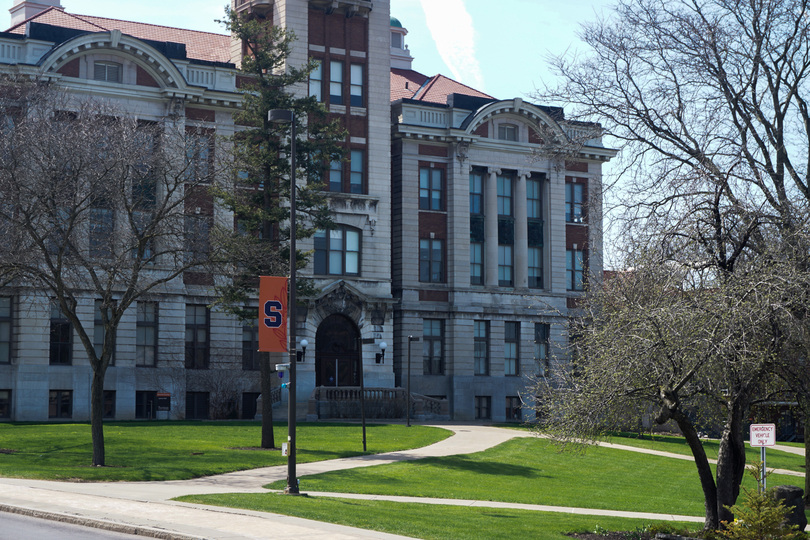Opinion: Trump’s threats shouldn’t keep students from peacefully protesting

College is a time for students to find what they care about and advocate for it. Our columnist says that universities overstep on maintaining the right to protest, which silences crucial voices in the community. Leanne Rivera | Staff Photographer
Get the latest Syracuse news delivered right to your inbox.
Subscribe to our newsletter here.
College campuses have fostered peaceful student protests since the Civil Rights movement in the 1960s.
The freedom to assemble is essential for all Americans, as it allows us to cast light on injustices both foreign and domestic.
This right, included in the First Amendment of the United States Constitution, has been attacked in recent years, primarily due to an increasing amount of political division in our nation. It’s created a gap that fuels hatred between parties as each faction attempts to silence the other by any means necessary.
This volatile uncertainty makes it obvious why private institutions would want to interfere with protests in an effort to protect students, but using this framework to completely silence demand for reform can’t become the norm.
Universities are allowed to set guidelines to limit disruptive protests on their campuses, but often fail to do so effectively. Recent events at Columbia University bring these shortcomings into the spotlight.

Hannah Mesa | Design Editor
At the start of its fall 2024 term, Columbia instituted new rules designed to prevent future damages like those inflicted on its campus during protests in the spring 2024 semester.
Dr. Katrina Armstrong, Columbia’s interim president, claimed at the time that these guidelines were designed to limit the amount of harmful on-campus protests and demonstrations while simultaneously promoting free speech and debate.
Columbia is still struggling with the nature and safety of these protests, making it clear these rules aren’t enough to maintain constructive order on campus. Now, President Donald Trump’s administration has begun targeting campus protests and those involved.
The Department of Homeland Security used its expanded powers to seize Mahmoud Khalil, a Columbia graduate who has advocated for Palestine not only in Manhattan, but nationally. Efforts by the Trump administration to deport Khalil have been unsuccessful to this point, but it remains a possibility.
Khalil’s case is disturbing and illustrates how Trump will cruelly use certain protests to single out marginalized, outspoken international students and do his best to expel them from our nation.
Undoubtedly, under our current administration, universities must put the safety of their students first — but this priority should be followed closely by upholding their right to assemble and speak out.
Though private institutions should be more active in ensuring protests on their campuses are calm and productive, we’ve seen universities overstep the bounds of control.
Syracuse University was quick to dish out unjust punishment to protestors who participated in the Gaza Solidarity Encampment on campus this past April.
The students, who remained in the encampment on the Shaw Quadrangle for over two weeks, advocated for SU to divest from companies and call for a ceasefire. At the time, Allen Groves, SU’s senior vice president and chief student experience officer, released a statement emphasizing the university’s commitment to free expression and students’ right to assemble, while also reiterating that SU does not tolerate harassment or threats.
Even though it was a peacefully conducted protest intended to raise awareness, SU later imposed disciplinary action on these students, claiming the protest violated its Student Conduct Code.
College environments should enable and influence young people to advocate for issues they see in our world, and they shouldn’t be discouraged from doing so as long as it’s done with civility.
Next time a protest like this inevitably happens, SU should be sure to let the demonstration — if it remains respectful — run its course and make sure participating students feel heard and supported in their efforts.
It’s essential that private institutions see the real threat Trump’s administration poses to fundamental higher education rights, no matter the viewpoints held by the student body in question. He’s going beyond his power to divide and separate Americans with ruthless and exclusive ideologies.
Trump recently issued a warning statement, saying that universities that reject his orders against allowing protests will lose funding. This will likely force many into submission.
As a result, certain student groups don’t have the safety they deserve to use their voices and exercise the rights all Americans should possess. Instead, on-campus protests are being forcibly denounced. Even if they’re done in complete composure on a smaller scale, Trump’s unprecedented wrath is likely to follow.
Campus administrators need to confront these difficult truths in search of school policy that both enables and protects, ensuring diverse and historically-excluded groups of people aren’t drowned out in a time of oppression and tyranny.
Private universities need to work harder to help campus resistance remain civil, regardless of the political affiliation of these demonstrations. Until we have an administration that’s willing to enforce and conserve the First Amendment without bias once again, it’s not an option to sit out while our speech is filtered and met with consequences.
As students, we must turn to our academic institutions to uphold a safe learning environment, but also provide a place for productive political conversation. Now isn’t the time to give up our pursuit of advocating for the global issues we care about most passionately.
Will Chadwick is a freshman psychology major. His column appears weekly. He can be reached at wchadwic@syr.edu.






